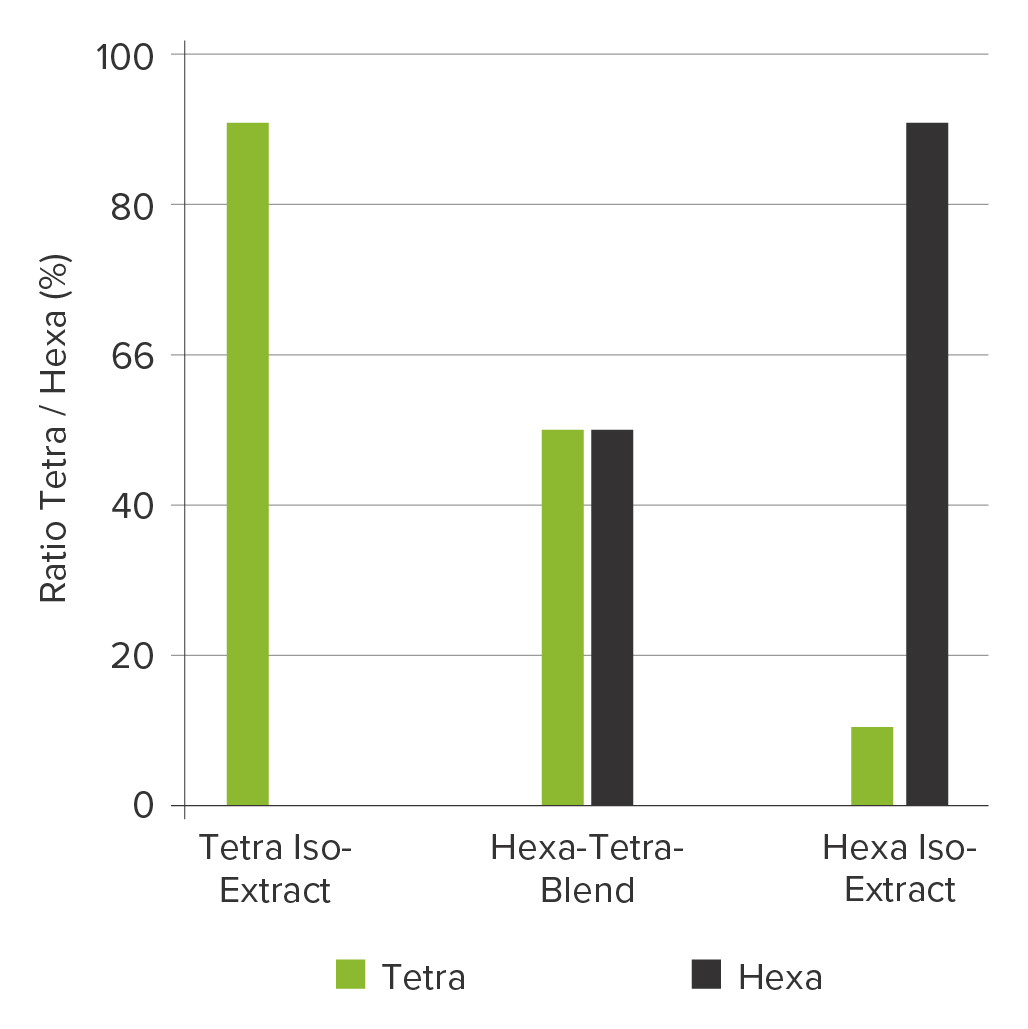
Hexa Iso-Extract (9:1)
Overview
Hexa Iso-Extract (Hexa) is a pure, aqueous solution of the potassium salts of hexahydro iso-alpha acids derived from CO2 hop extract.
Hexa greatly enhances beer foam when used as a post-fermentation replacement for a portion of conventional bittering products.
Hexa provides protection against lightstruck flavor when used as the sole source for bitterness or in combination with other light stable hop products.

Specifications
- Short description
- light-stable, aqueous hop extract with foam-stabilizing properties
- Alpha acids
- below detection limit
- Iso-alpha acids
- below detection limit
- Tetrahydro-Iso-alpha acids
- 1.0 ± 0.5 % (w/w) HPLC
- Hexahydro-Iso-alpha acids
- 9.0 ± 0.5 % (w/w) HPLC
- pH
- 9.5 ± 1.0
- Density
- ca. 1.02 g / ml (20°C)
- Viscosity
- 2 - 6 mPas (20° C / 68° F)
Properties
Appearance
Hexa is a homogeneous, amber-colored, clear aqueos solution.
Flavor
Hexa provides 1.0 to 1.2 times the sensory bitterness compared to that achieved with iso-alpha acids. The actual intensity of bitterness depends primarily on the quantity of bittering units and the type of beer. Therefore, the target number of bittering units must be determined in preliminary tests in order to achieve the correct level of sensory bitterness.
Utilization
Based on HPLC analysis of the finished beer, utilization of Hexa is 60 - 80 %, depending on the timing and efficiency of the addition. Actual utilization will vary from brewery to brewery due to differences in equipment and process conditions.
Light Stability
Hexa only provides protection against lightstruck flavor in the complete absence of alpha acids and iso-alpha acids. Hexa can be used in conjunction with any Hopsteiner® light stable product to achieve light stability.
Foam Stability
Hexa enhances both beer foam retention and cling. An improvement in beer foam is already noticeable at 2 - 3 mg/l of hexahydro iso-alpha acids in the finished beer.
Quality
All Hopsteiner® products are processed in facilities which fulfill internationally recognized quality standards.
Packaging
Our products are delivered in their respective recommended standard packaging. Alternatives may be possible upon customer request.
Standard packages of our processing plants in the USA (US) and Germany (DE) are:
- Canister 20 kg (US / DE)
- Jug 10 kg (US)
- Pail 20 kg (US)
Usage
Hexa is typically used as a post-fermentation addition and prior to the final step in filtration.
For Light Stable Beer
For maximum protection against lightstruck flavor, it is essential that no other sources of non-reduced iso-alpha acids are inadvertently introduced into the wort or beer. Therefore, the following must be carefully implemented:
- exclusive use of light stable hop products throughout the entire process.
- avoid contamination through equipment surfaces previously in contact with regular iso-alpha acids.
- never pitch wort with yeast that has been in contact with regular alpha and iso-alpha acids.
Dosage
Dosage is based on the product concentration, an estimated or known utilization and the desired intensity of bitterness in the beer. The fact that the perceived bitterness of Hexa is about 1.0 to 1.2 times the bitterness of iso-alpha acids derived from conventional hop products must be taken into consideration. The correct dosage of Hexa must be determined through trials at the brewery.
Application
We recommend adding Hexa at full strength (undiluted) into the center of the beer stream for at least 70 % of the total volume being transferred. An accurate, high pressure dosing pump is required to add the product into the beer stream at a point where vigorous mixing is assured. Hexa can be added at ambient temperatures. If dilution is necessary, always add Hexa to demineralized water first and adjust the pH to 8.5 - 9.5 using either potassium hydroxide (KOH) or potassium carbonate (K2CO3). Laboratory scale testing is recommended prior to commercial use. If containers are used over several days, it is recommended that the headspace be flushed with nitrogen (CO2 is not suitable).
Cleaning Recommendation
Hexa should not be left in dosing lines at low temperatures. Lines and dosing pumps should be flushed with warm, slightly alkaline, demineralized water or ethanol for purposes of cleaning.
Storage
The recommended storage temperature in the original unopened packaging is 5 - 25 °C (41 - 77 °F).
For prolonged storage, a temperature of 10 - 20 °C (50 - 68 °F) is ideal.
Best Before Date
Under the recommended storage conditions, the shelf life from the date of production/ packaging is at least 1 year.
Safety
Ensure good ventilation of the workplace and wear personal protective equipment. Avoid contact with eyes and skin. Do not inhale vapors or dusts. For full safety information, please refer to the relevant Hopsteiner® safety data sheet.
Analytical Methods
International approved methods listed in commitees such as ASBC or Analytica-EBC using current standards are applied.
Product analytics
- Analytica-EBC 7.9 (HPLC)
- ASBC Hops-18 (Spectro)
Beer analytics
- Analytica-EBC 9.47 (HPLC)
The standard formula for calculating bitter units in beer (Analytica-EBC 9.8 or ASBC Beer-23A) may need to be adjusted as it results in too low values when using higher amounts of Hexa.
- NIBEM Cling
- NIBEM-T Meter
- Pour Test
- Ross & Clark
- Steinfurth Foam Stability Tester
Technical Support
We are pleased to offer assistance and advice on:
- safety data sheets
- support for brewing trials on a pilot or commercial scale
- analytical services and information about analytical procedures
Disclaimer: The information provided in this document is believed to be correct and valid. However, Hopsteiner® does not guarantee that the information provided here is complete or accurate and thus assumes no liability for any consequences resulting from its application.
Last updated: 17/11/2023
Save PDF